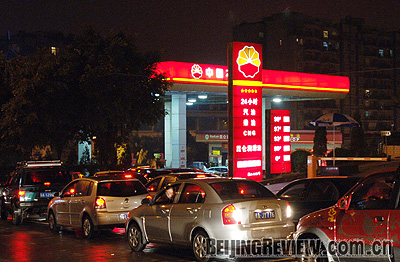| Numbers of the Week
114.4 billion yuan
PetroChina Co. Ltd., the largest crude oil and gas producer in China, made a profit of 114.4 billion yuan ($16.7 billion) in 2008, down 22 percent year on year.
15 million tons
Asia's largest lead and zinc mine, with a potential value of more than 200 billion yuan ($30 billion), was discovered in Lanping County, Yunnan Province.

TO THE POINT: To prevent the economy from further contractions, the Chinese Government promulgated a package of new measures, including increasing export tax rebates for six industries as of April 1. Local governments issued new bonds to finance the construction of public facilities. The central banks of China and Indonesia signed a currency swap agreement to avoid U.S. dollar fluctuations. Despite skepticism about the value of the U.S. dollar, top Chinese officials bought more dollar assets, because they believe no other currency is more reliable. China's banking industry remained robust despite dismal performances by foreign banks. The government raised domestic fuel prices as the price of international crude oil surged.
By LIU YUNYUN
Fuel Price Hike
Escalating international crude oil prices have sparked the first fuel price hikes this year in China.
The National Development and Reform Commission (NDRC) decided to raise gasoline and diesel prices to 290 yuan ($42) and 180 yuan ($26), respectively, as of March 25. Drivers now have to pay about 0.2 yuan ($0.03) more per liter for each.
The NDRC, the nation's top economic planner, determines the prices of refined oil products as well as a wide range of other commodities concerning people's livelihoods.
In January, the NDRC had cut fuel prices mildly in light of the tumbling crude oil prices. But since the beginning of March, crude oil prices have surged almost 34 percent because of reduced output and the depreciating U.S. dollar.
Some analysts believe the NDRC's price readjustment is reasonable in light of soaring crude oil prices. But some also have cast doubts about the timing of the price hike. Han Xiaoping, President of China5e.com, a website dedicated to energy-related issues, told the Securities Times that the move might have been too hasty considering weak domestic demand and the operational difficulties many factories are having at the moment.
Boosting Exports
China decided to raise export tax rebates for six industries as of April 1 to prop up its deteriorating exports.
The decision was made at a State Council meeting chaired by Premier Wen Jiabao, although specific tax rebate rates were not announced. Textiles and garments, lights, iron and steel, nonferrous metals, petrochemicals, and electronic products are supposed to get a boost from the readjusted policy.
Bleak international demand has caused a drop in China's exports, which have been a major driver of GDP growth. But exports have nosedived in the past few months. In February, they fell 26 percent year on year, faster than the pace of the decline in imports.
Xu Qing, a small merchandiser in south China's Guangdong Province, said she welcomed the tax rebate rise. She told Beijing Review that she had secured hardly any major product orders from her trade partners overseas during the past three months.
"The government was meant for good, but the root cause of the current export collapse is shrinking international demand," Xu said. She added that she expected no real export boom until the international economy stabilized and the financial market chaos had cleared up.
Foreign Reserves Endangered
The U.S. Federal Reserve's decision to buy $300 billion in long-term U.S. treasury bonds ignited fears of the dollar's devaluation.
Domestic experts have worried that the U.S. Fed might resort to printing more greenbacks to inject money into the country's crumbling financial markets. Now this is the case, they say.
The new measure was intended to revive the sagging U.S. economy, but in effect will cause a major slump in China's huge dollar-dominated foreign reserves.
China is now the biggest holder of U.S. treasury securities. About two thirds of China's $2 trillion foreign reserves are U.S. dollar assets.
Despite their diminished value, China might keep accumulating U.S. dollar assets.
Hu Xiaolian, Director of State Administration of Foreign Exchange and Vice Governor of Chinese central bank, said China would continue to buy U.S. treasury securities, because they were less risky. China will take into consideration long-term strategic factors instead of acting precariously based on short-term currency volatility, according to Xinhua News Agency reported.
Hu said she believed the current financial meltdown would not mean the end of the dominant status of the U.S. dollar. She said the dollar's position was still unshakable in international trade, settlements and payments.
Another Currency Swap Deal Inked
The central banks of China and Indonesia signed a currency swap agreement totaling 100 billion yuan ($15 billion)-the fifth such bilateral agreement signed by the Chinese central bank since last December.
The deal gives Indonesia access to 100 billion yuan of Chinese currency, while China can use the same amount of Indonesian rupiah.
China already has similar deals with South Korea, Hong Kong, Malaysia, and Belarus. The bank said in a statement that it might extend these agreements accordingly.
| 